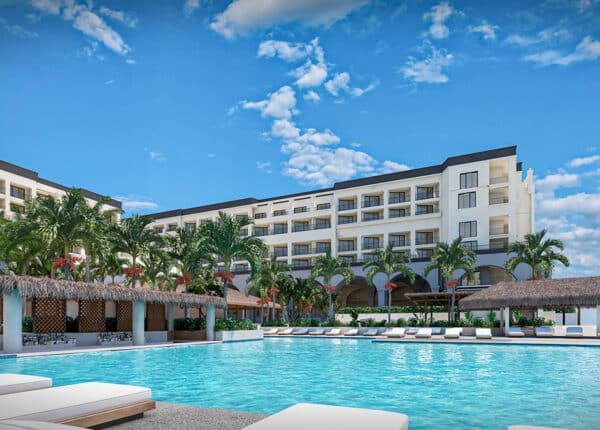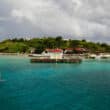What China and Europe Mean for the Caribbean, from Haiti to Barbados
By Alexander Britell
CHINA AND EUROPE remain the biggest threats to the Caribbean’s economy — that is, Chinese deceleration and European debt. But how vulnerable is the Caribbean to those potential external shocks? A recent study from the Inter-American Development Bank found that the Latin American and Caribbean economy remains resilient in the face of those external economic threats – meaning that, even if China’s growth decelerated and Europe’s debt crisis expanded, it would only mean a “relatively mild” recession in the region. To learn more, Caribbean Journal talked to Andrew Powell, principal economic advisor for the IDB’s research department and the author of the report.
What are the two major economic risks to the Caribbean?
The two major risks that we talk about in the report are really the risks if Europe’s problems deepen and China’s growth slows a bit more. So we wanted to explore how those would impact Latin America and the Caribbean. So what we did was an analysis, supposing if Europe had the same kind of problems that the US had after the Lehman bankruptcy, although we do not think that necessarily that event will be the same, and, in fact, I’m sure it won’t be, but just supposing it was the same magnitude of an event, and then add a small decline in Chinese GDP. Then we added an additional financial shock coming from whatever you think might happen in Europe. So that is the cocktail of schocks.
How interconnected is the Caribbean with those two economies?
Well, they’re interconnected in different ways. About 11 percent of Latin American and Caribbean exports go to Europe, but in fact, it’s quite heterogenous, so the impacts are felt more on Latin America than, say, Central America and the Caribbean. The Caribbean, of course, is more impacted by the US, although it also gets tourism, exports and so forth from Europe. So there are those linkages, but then there are other linkages as well. For example, China is important for commodity producers, which are important for many countries in Latin America, particularly those who are quantity producers; also, Guyana and Suriname in the Caribbean. And then, of course, we have other links as well, through capital flows, Foreign Direct Investment and the banking sector, where there are several countries in Latin America and the Caribbean that have European banks present in their systems, and that also receive lending from international banks, including European banks.
Are there any countries you see in the Caribbean that are particularly strong, or particularly vulnerable to these shocks?
In the Caribbean, you have a set of more domestic vulnerabilities, which of course might compound any external shock. In particular, you have countries that have higher debt than elsewhere in Latin America and the Caribbean, so countries that have higher debt, and hence fiscal policy is more restrained, you have less room to react if there’s a negative shock. So Jamaica, Barbados and even, to some extent, the Bahamas, which obviously has lower debt than Jamaica and Barbados, but Jamaica and Barbados have debt well over 100 percent of GDP, they have less room to react, if there is a negative shock, in terms of fiscal policy. And in terms of monetary policy, Barbados has a fixed exchange rate. It does have some limited monetary movement because it has capital controls. Jamaica has a floating exchange rate with some management, but, because of the fiscal position, it’s hard for Jamaica to use either fiscal policy or monetary policy to react to any negative shock.
The report mentions decreased capacity to implement a stimulus package, because of those debt constraints. What is the alternative, then, in the event of these shocks?
I think the countries are well aware of the risks, and they’re already doing a number of things. So I think they’re already on a policy framework to try to resolve the problems. In some instances, particularly Jamaica, I understand the new government is making an IMF agreement, and I think that would be a positive development. Because I think that, in the context of an IMF agreement, the country will definitely have great resilience. Barbados has very good relations with the IDB and it also has some external official lenders as well. We lend to Barbados, we have good relations with Barbados, so they do have some external official sources as well, and they have good access to credit markets, a good relationship with their creditors. So we don’t foresee any particular problems, but they need to, of course, try to resolve their problems and do structural reforms which would eventually lead to more growth.
Haiti’s economy has been growing, particularly due to reconstruction. How vulnerable is Haiti’s economy?
I think Haiti is a very special case for many reasons. I think in some ways, it’s less vulnerable to these kinds of risks, because it’s somewhat less integrated into global international markets. So I don’t think these are the biggest risks for Haiti. Let’s put it that way. Obviously there’s some impact, especially from the US, but even there, Haiti is beginning to do very well. It has preferential access to US markets, and obviously gets a lot of remittances from the US. But they’re reasonably stable in the face of shocks. So I think there are risks for Haiti, but Haiti’s risks are more internal, domestic, than these kinds of risks.







